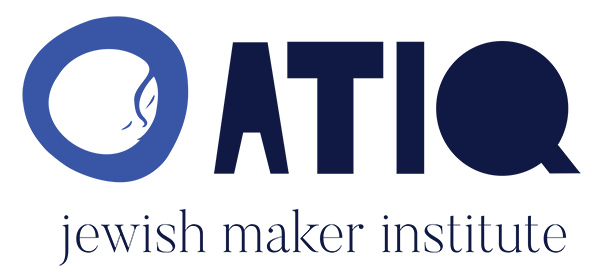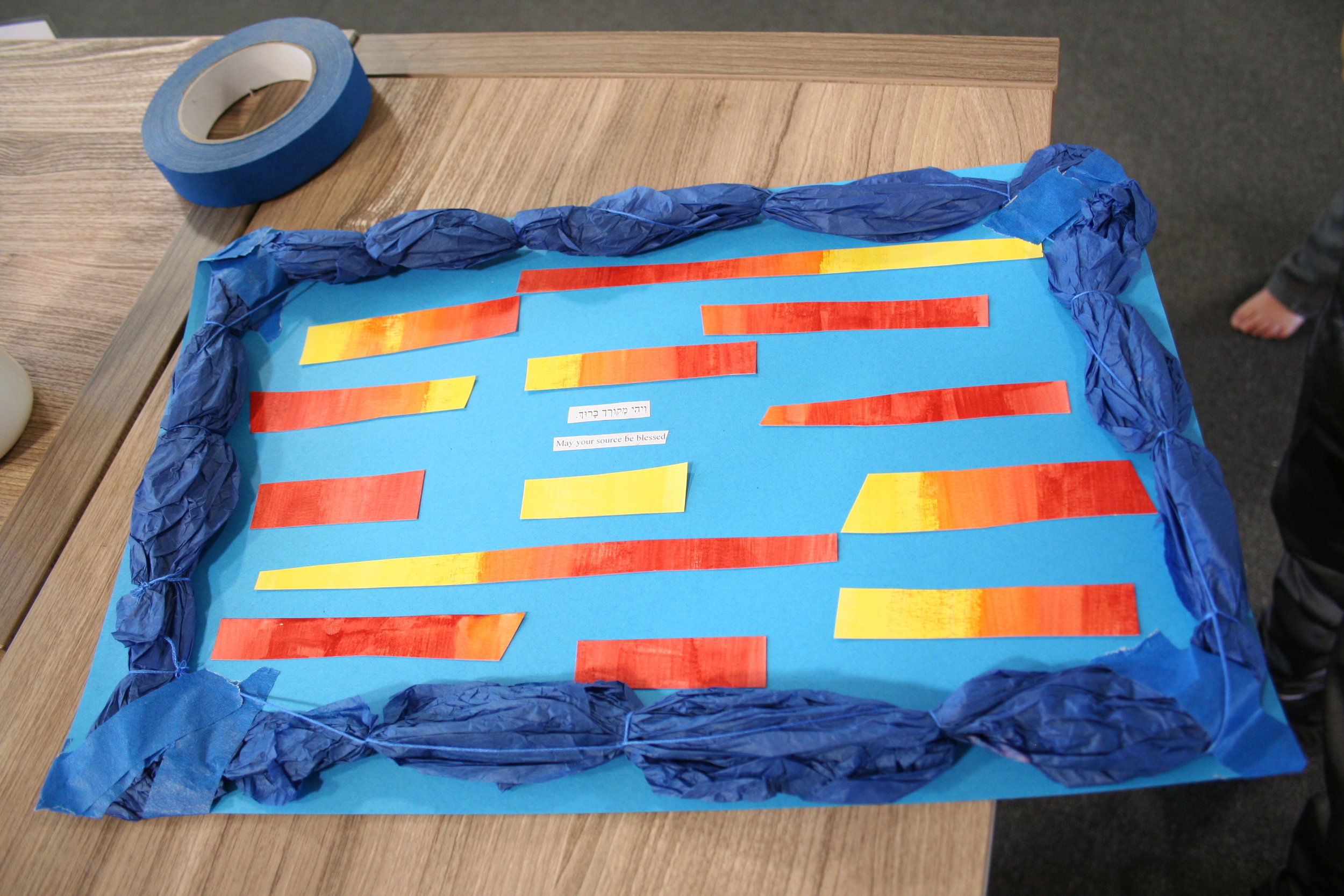Our pre-Yom Kippur workshop, generously hosted at Studio 70 (which houses the Edah afterschool prorgam) was a sweet window of creative spiritual preparation in an otherwise incredibly busy and potentially hectic feeling time of year. It was also our first workshop inhabiting our new name - Atiq: Jewish Maker Institute, and an experiment with fulfilling one of our meta-goals at Atiq - multi-generational contexts where people of all ages and all stages of life can all feel included and valued, in learning and creating and playing together (in this instance we had makers ages 7-ish and up, while younger participants were mostly in the on-site babysitting, except when they toddled over to contribute their own artistic experiments, or an occasional cry for a parent's attention).
This workshop focused on the power of blessing and in particular, a really special blessing whose arrival I eagerly await each year, but is not especially well known.
First, a bit of background: On Friday nights, around the Shabbat table, some parents have the custom to bless their children. "May you be blessed like Sarah, Rivkah, Rachel and Leah (for a girl)/ May you be blessed like Ephraim and Menashe (for a boy); May God bless and protect you, may God's radiant face shine upon you and regard you with favor, may God turn God's face towards you and grant you peace."
As Yom Kippur approaches there is also a custom for parents to bless their kids, and the traditional blessing begins with the same format as the version on Shabbat. On Yom Kippur, though, the blessing continues in rich detail, with prayers for all sorts of spiritual and physical aspirations for the year ahead.
Every year, at some point in the afternoon before Yom Kippur, I receive this blessing from my parents (ok, really from my dad, but my mom is for sure included in spirit, even while she is actually cooking the pre-fast meal). There are some years where this happens in person, and some years that I listen to the blessing over the phone. Either way, once I've received my pre-Yom Kippur blessing, I feel that I'm standing a bit taller, I have a greater sense of focused energy with which to enter the inspiring but also arduous hours of Yom Kippur. In fact, it often feels like the energy I receive from the one minute pause in the rush of a day preparing everything before the fast reverberates to carry me through the entire year ahead.
How, I've been wondering, can one blessing carry with it so much energy-giving power? When I reflected on what text I might share in our workshop, it was the words of this blessing that stood out in my memory, more than any others that we say in the liturgy of Yom Kippur (beautiful as those are). Why?
This workshop was a sustained reflection on those questions. Rabbi Nehemia Polen (my dad, a professor at Hebrew College, but more relevant for this purpose, Atiq's Director of Content), has noted that "blessing is not the time to impose our desires and expectations. So what is being conveyed? Acknowledgement, regard, a sense that I value you, I trust you, I put the future in your hands, I see an abundance of great possibilities for you."
While the special "Children's blessing" before Yom Kippur is generally recited by parents to the children in their nuclear family, we broadened our focus to include anyone in the role of parent or child, or really anyone who wishes to access the power of blessing -- either as a giver or a receiver. Our tradition teaches (see, eg. the Piacetzner Rebbe, Eish Kodesh parshat Hukat) that a parent is anyone who teaches Torah or something of value to another person, and a child is someone who continues the legacy or project of someone who could not complete it themselves. In a sense we are all trading off these roles all the time.
Working in hevrutah pairs, we learned through the text of the blessing, and each person highlighted words that they felt particularly drawn to as yearnings for the new year, or added words or prayers that resonated more personally.
Hevrutah partners then swapped pages, such that now my hevrutah had my page of highlighted words, and I had theirs. The prompt for creating: weave those resonant words, those specific points of focus into a visual blessing for your hevrutah that they will then carry with them into the year.
And so we dropped into an hour of thinking, and tinkering, investigating textures and smells (I've begun to include a selection of spices in our materials for workshops), and interviewing/asking refining questions of our hevrutas ("when you said 'facing what's really there' I noticed you used the word appreciation a lot..."), and pausing for the occasional puzzle making with younger siblings.
By the end we had created 10 specially designed blessing-gifts to share with our hevrutah partners, and say (whether explicitly or implicitly) something along the lines of: I appreciate you, I wish for you the best that your heart imagines and even more, the world needs your unique contributions, and you are truly valuable!
A quick overview of the creations: A lot of people highlighted the words Yehi Mekorcha/Mekorech Baruch - May your source be blessed, and reflected on when what's at the source is blessed, then everything that follows from that is also blessed.
Daniel created a sign for Elijah, incorporating Elijah's favorite navy blue color.
Elijah created a contraption with a colorful sphere that moves and is attached by a string to a watercolor painted disk at the top. This one really reminded me of a Hasidic story about a Rebbe that was slipping down an ice-covered mountain in Russia as he was trying to get down to dunk in the mikvah (maybe before Yom Kippur). When he returned unscathed his followers asked him how he hadn't gotten injured in the fall, and he responded, when you're holding on to the rope that's connected up above, you don't slip (ie, when you're connected to God, you aren't impacted in the same way by physical "realities").
Liora's chosen words included a prayer for income security and Asher thoughtfully created a structure that she could metaphorically stand in, where he imagined that from that vantage point she could receive what she was praying for. Which felt so insightful, and reminded me of this notion that we need the kli, the appropriate vessel before we can truly receive a blessing.
Asher's words (inspired by the Children's blessing, and with some of his own) were "desire for Torah and Mitzvot...and time to play!" so Liora created him an amazing clock with components representing all of those elements.
Raizy created an interpretation of the many positive directions that can develop out of being blessed at the source, and included little bags of spices along with each of those metaphorical blessings on this interactive wall hanging, with a blue background evoking water.
Andrea, woking with the same theme, created a mug coaster, that was filled with hidden and revealed spices, which would waft out fragrance when the were warmed when a mug of tea or coffee was placed on them.
Ezra's words included time learning MIshnah (he and Ariel have recently started that), an elephant and just enjoying creating and being alive, so Ariel created a diorama including a six petaled flower, representing the six books of mishnah, with spices at the center which you encounter when the petals of the flower open, and two trees that can also be seen as one, representing the Torah as the tree of life (which in Hasidic thought is also seen as ultimately the same as the tree of knowledge)...and of course an elephant at the center because of course.
(As a side note, this was the first time that Ariel, our Rabbi-in-Residence at Atiq, and also by day a professor at Stanford, participated in the creating component of Atiq. This was a source of great delight for me, and he noted "I'll never forget the power of creating a tangible blessing for someone I love.")
Ezra made Ariel a drawing that represented "all the worlds".
I noted to Aliza my feeling of connection to the words "Einayich l'nochach yabitu/ May your eyes always perceive what's in front of you/be able to look straight ahead," and my hope to better appreciate all the blessings that are right in front of me in the coming year, and to generate income from my work that allows me to keep doing it and allows it to grow and flourish.
So Aliza created a viewfinder that can also serve as a bookmark for the machzor during Yom Kippur services, and an additional piece with two parts - the purple ball represents prosperity/financial stability, so that ultimately one can turn their attention to what really matters, what you see right in front of you (represented by the mini viewfinder).
For her words, Aliza had reflected on wanting to find more ways to connect with things that would nourish her intellectually and spiritually, during otherwise very busy days attending to family, etc. So I created something that ended up looking like a fancy magnifying glass, to help her remember to focus in on interesting books or podcasts even in small windows of time, and little clips that she could hang her top 3 things to turn to on.
Speaking for myself, I was truly relieved and gratified that someone with Aliza's discerning eye for design and beauty liked the object I made for her, and I was incredibly moved to receive her interpretation of my words, and look forward to using it on Yom Kippur.
As we reflected on the process of creating, some noted that it felt freeing and especially fun to create something for someone else. For others it felt a bit nerve-wracking, and some perhaps felt a tiny twinge of loss in giving away their creation. While we didn't reflect on it quite as directly, my sense is that everyone felt gratitude and joy upon receiving their partner's blessing-object. But there can sometimes be a bit challenge there as well - perhaps a deeper layer felt missed, unseen. My hope is that through this process, the complexity and amazing power of how we give and receive blessings was appreciated and experienced in a really visceral way. As we approach Yom Kippur, as individuals and collective, may we accept the gift of being connected with those around us enough that we can both give and receive blessings for living with a greater sense of purpose, vitality, presence, joy, and connection in the year ahead.
Thank you to all who joined for this workshop, to Rabbi Nehemia Polen, Ariel Mayse, and Aliza Weiss (our talented Program Manager) for insights into sources and structure (as always) and to all of you readers for joining from afar (and for any thoughts or reflections you might care to share, especially on privileged objects or blessings from parents or friends that have been a source of positive energy for you). And one more shoutout: Immense gratitude to Atiq mentor and advisory board member Rabbi Dr. Michael Shire. When I reached out to him on Friday before the Sunday of the event to say, I still can't figure out how to manifest the learning in the prompt for making, he said "call me! I'm only writing sermons!," and proceeded to pause his sermon writing for an hour long chat about spiritual meaning making through making. Inspired by his example, another blessing to walk into Yom Kippur with: May this be a year in which we have wise teachers, mentors, family and friends whom we know we can reach out to for counsel, and may we have the patience, time, and thoughtfulness to pause when friends reach out for our help.
May we all be sealed in the book of life for a sweet new year! Shana tova!




























